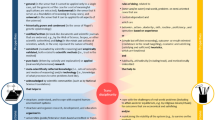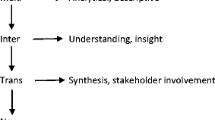Abstract
The emerging classification of Sustainability-oriented Innovation Systems places an emphasis on the social elements of change, as well as the technological. However, sustainability-oriented problems are too vast for one person or discipline to comprehend; thus people tend to want to collaborate, meaning they form teams. As a further extension to address sustainability-oriented problems, there is an increasing emphasis on transdisciplinary research and development (R&D) efforts, whereby coproduction transgresses boundaries, and science becomes visible before it becomes certain. To reach the objectives of transdisciplinary R&D efforts will require two key concepts: the gathering of information from experts, namely, knowledge transfer; and making connections between them, namely, knowledge integration. Nevertheless, challenges have been noted in terms of academic tribes that impede teamwork, and, importantly, the lack of combined thought and action in R&D. This chapter explores the collaboration, between disciplines, that has been described as the means of meeting the requirements of transdiscplinary R&D to identify, structure, analyze, and deal with specific problems in such a way that it can: grasp the complexity of problems; take into account the diversity of life-world and scientific perceptions of problems; link abstract and case-specific knowledge; and develop knowledge and practices that promote what is perceived to be the common good. However, the latter brings into question how values and culture influence collaboration and thus transdisciplinary R&D efforts. The chapter subsequently builds on an introduced conceptual framework to understand how the values and culture of individuals in a transdisciplinary R&D team, as well as those of the organization, determine the potential success or failure of the R&D effort. A case study in the bio-energy field is used as basis. The R&D project, which spanned over 3 years in South Africa, required a transdisciplinary team of engineers and scientists of various fields to collaborate with stakeholders outside the R&D team. The case emphasizes that the lack of engineering disciplines to recognize, understand, and incorporate values and culture into R&D practices will lead to project failure; pre-empting and managing expectations of social change (often) far outweigh the necessity for technological change. A number of recommendations are thus made to improve sustainable engineering R&D practices.
Access this chapter
Tax calculation will be finalised at checkout
Purchases are for personal use only
Similar content being viewed by others
References
T.M.B. Aasen, O. Amundsen, M. Mølnvik, G. Tangen, in Innovation in Transdisciplinary and Heterogeneous Collaborations: Exploring New Ways of Organizing Environment-Friendly Energy Research. COMBI2010 Conference Proceedings (Vantaa, Finland, 2010)
Z. Acs, Regional innovation, knowledge, and global change (Pinter, London, 2000)
A.C. Brent, M. Swilling, An Investigation into the Challenges of Transdisciplinary R&D: Values, Culture and the Case of the BIOSSAM Project. R&D Management Conference (Norrkö**, Sweden, 2011)
L. Carlson, Crossing the line. Altern. J. 33(5), (2007), available from: http://www.alternativesjournal.ca/articles/crossing-the-line
L. Coenen, J.D. Lopez, Comparing systems approaches to innovation and technological change for sustainable and competitive economies: an explorative study into conceptual commonalities, differences and complementarities. J. Clean. Prod. 18(12), 1149–1160 (2010)
H.M. Collins, R. Evans, The third wave of science studies: studies of expertise and experience. Soc. Stud. Sci. 32(2), 235–296 (2002)
T.K. Das, R. Kumar, Interpartner sensemaking in strategic alliances: managing cultural differences and internal tensions. Manag. Decis. 48(1), 17–36 (2010)
B. Elzen, F.W. Geels, K. Green, System Innovation and the Transition to Sustainability: Theory, Evidence and Policy (Edward Elgar Publishing, Massachusetts, 2004)
F.W. Geels, Technological transitions as evolutionary reconfiguration processes: a multi-level perspective and a case-study. Res. Policy 31, 1257–1274 (2002)
L.K. Hessels, H. van Lente, Re-thinking new knowledge production: a literature review and a research agenda. Res. Policy 37, 740–760 (2008)
G. Hofstede, Dimensions do not exist: a reply to Brendan McSweeney. Hum. Relat. 55(11), 1355–1361 (2002)
K. Hollaender, Success factors in inter- and transdisciplinary research: selected results from the program Urban Ecology. in Interdisciplinary and Transdisciplinary Landscape Studies: Potential and Limitations, ed. by B. Tress, G. Tress, A. van der Valk, G. Fry. DELTA Series, vol 2 (Delta Program, Wageningen, 2003) pp. 91–99
R. Lipshitz, M. Popper, V. Friedman, A multifacet model of organizational learning. J. Appl. Behav. Sci. 38, 78–98 (2002)
B-Å. Lundvall, K.J. Joseph, C. Chaminade, J. Vang, Handbook of Innovation Systems and Develo** Countries: Building Domestic Capabilities in a Global Setting (Edwar Elgar, Massachusetts, 2009)
K. Nortje, Understanding the research and thinking process of a multi-disciplinary group planning for sustainability. Working Paper, Natural Resources and the Environment, CSIR, Pretoria, 2011
M. Peneder, Technological regimes and the variety of innovation behaviour: Creating integrated taxonomies of firms and sectors. Res. Policy 39(3), 323–334 (2010)
C. Peter, M. Swilling, Greening the South African growth path: Transitioning to sustainability. Development Bank of Southern Africa, Midrand, 2011
C. Pohl, G. Hirsch Hadorn, Methodological challenges of transdisciplinary research. Nat. Sci. Soc. 16, 111–121 (2008)
T. Quinlan, P. Scogings, Why bio-physical and social scientists can speak the same language when addressing sustainable development. Environ. Sci. Policy 7, 537–546 (2004)
B.J. Regeer, J.F.G. Bunders, Knowledge co-creation: Interaction between science and society. A transdisciplinary approach to complex societal issues. Advisory Council for Research on Spatial Planning, Nature and the Environment (RMNO), 10e, 2009, available from: http://eeac.hscglab.nl/files/NL-RMNO_knowledgecoop_Jun09.pdf
G. Reger, C. von Wichert-Nick, A learning organization for R&D management. Int. J. Tech. Manag. 13, 796–817 (1997)
D.J. Roux, R.J. Stirzaker, C.M. Breen, E.C. Lefroy, H.P. Cresswell, Framework for participative reflection on the accomplishment of transdisciplinary research programs. Environ. Sci. Policy 13, 733–741 (2010)
P. Sillitoe, Interdisciplinary experiences: Working with indigenous knowledge in development. Interdiscip. Sci. Rev. 29(1), 6–23 (2004)
A. Smith, J.-P. Voß, J. Grin, Innovation studies and sustainability transitions: The allure of the multi-level perspective and its challenges. Res. Policy 39(4), 435–448 (2010)
P. Söderbaum, A financial crisis on top of the ecological crisis: Ending the monopoly of neoclassical economics. Real-World Econ. Rev. 49, 8–19 (2009)
W.H.L. Stafford, A pre-feasibility study prepared for Agulhas Biodiversity Initiative (ABI) Energy Working Group, 2011, Council for Scientific and Industrial Research report no. CSIR/NRE/RBSD/IR/2011/0034/C, available from: http://www.biossam.org/resources/
W.H.L. Stafford, A.C. Brent, An introduction to BIOSSAM – the South African Bioenergy Systems Sustainability Assessment and Management portal. J. Energy South. Afr. 21(4), 32 (2010)
A. Stamm, E. Dantas, D. Fischer, S. Ganguly, B. Rennkamp, Sustainability Oriented Innovation Systems: Towards Decoupling Economic Growth From Environmental Pressures? (German Development Institute (DIE), Bonn, 2009)
M. Swilling, Sustainability, poverty and municipal services: The case of Cape Town, South Africa. Sustainable Develop. 18(4), 194–201 (2010)
C.R. Swindoll, Great Attitudes! 10 Choices for Success in Life (Thomas Nelson Publishers, New York, 2006)
United Nations Environmental Programme (UNEP), Decoupling and sustainable resource management: Towards a conceptual framework. UNEP International Panel for Sustainable Resource Management, Paris, 2009, available from: http://www.unep.fr/scp/rpanel/publications/
United Nations Environment Programme (UNEP), A brief for policymakers on the green economy and millennium development goals. Prepared for the UN Summit on MDGs, Green Economy Initiative, Geneva, 2010, available from: http://www.unep.org/greeneconomy
United Nations Environment Programme (UNEP), Towards a green economy: Pathways to sustainable development and poverty eradication. Green Economy Initiative, Geneva, 2011, available from: http://www.unep.org/greeneconomy
E.H. van Haaften, Disciplinary perception and interdisciplinary communication in management of natural resources. in Interdisciplinary and Transdisciplinary Landscape Studies: Potential and Limitations, ed. by B. Tress, G. Tress, A. van der Valk, G. Fry. DELTA Series, vol 2 (Delta Program, Wageningen, 2003) pp. 107–113
J.-P. Voß, Barriers to research and innovation for solving social challenges: Lessons from social-ecological research in Germany. CSTP Expert Workshop, OECD, Paris, 2009, available from: http://www.oecd.org/dataoecd/28/2/43278129.pdf
T. Williams, How do organizations learn lessons from projects – and do they? IEEE Trans. Eng. Manag. 55(2), 248–266 (2008)
Author information
Authors and Affiliations
Editor information
Editors and Affiliations
Rights and permissions
Copyright information
© 2013 Springer Science+Business Media Dordrecht
About this entry
Cite this entry
Brent, A. (2013). Transdisciplinary Approaches to Engineering R&D: Importance of Understanding Values and Culture. In: Kauffman, J., Lee, KM. (eds) Handbook of Sustainable Engineering. Springer, Dordrecht. https://doi.org/10.1007/978-1-4020-8939-8_90
Download citation
DOI: https://doi.org/10.1007/978-1-4020-8939-8_90
Publisher Name: Springer, Dordrecht
Print ISBN: 978-1-4020-8938-1
Online ISBN: 978-1-4020-8939-8
eBook Packages: EngineeringReference Module Computer Science and Engineering




